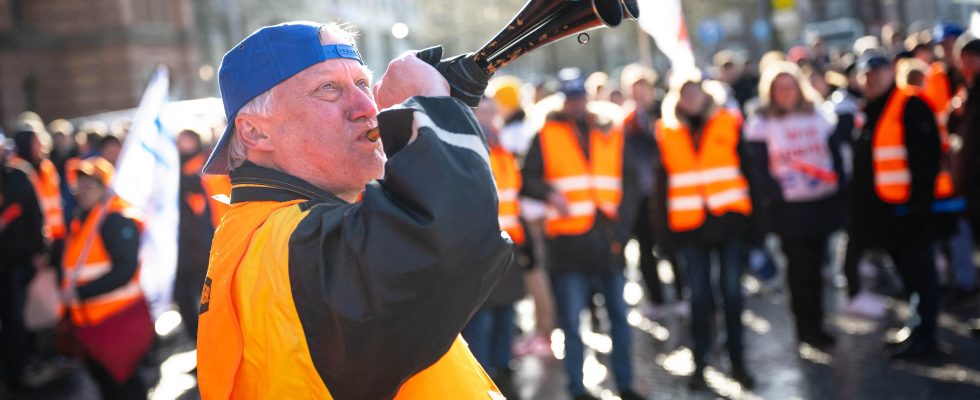It is a strike of an extremely rare scale for Germany. Employees of airports, rail, sea freight, motorway companies, local transport began at midnight on Monday March 27 a 24-hour work stoppage.
Why are employees mobilizing?
Unlike countries like France, such a unitary movement between the EVG and Ver.di unions, representing 230,000 railway workers and 2.5 million service employees respectively, is extremely rare.
This mobilization is part of a context of growing social tensions in Germany, where strikes for wages have multiplied since the beginning of the year, from schools to hospitals, including the Post Office. This “Mega-Streik” (mega-strike) – as the German media have already dubbed it – affects a country where prices have soared for more than a year, with inflation reaching 8.7% in February .
EVG and Ver.di are asking for more than 10% salary increase. Employers (states, municipalities, public companies) offer a 5% increase with two single payments of 1000 and 1500 euros.
What are the disruptions?
The unions have counted on a “broad mobilization”. Since Monday morning, nearly “30,000 employees” in the railway sector have already stopped working, according to EVG. Throughout the country, “mainline traffic has been suspended, as have regional lines”, according to Deutsche Bahn. Flights are canceled at most airports, including major Frankfurt and Munich. In many large cities, public transport is extremely disrupted. In Berlin, the S Bahn network, a set of trams and metros, is blocked.
The federation of German airports (ADV) denounced a strategy of “escalating strikes on the model of France”, where days of mobilization follow one another against the pension reform. “A social conflict that has no repercussions is a harmless social conflict,” replied Frank Werneke, president of the Ver.di union. The mobilization for wages in the services is accompanied by demonstrations.
Is Germany moving away from its culture of consensus?
The ground is increasingly favorable to the social movement in Germany, which is moving away from the culture of consensus that has made its reputation. “There have been more strikes in the last ten years in Germany than in previous decades,” observes Karl Brenke, an expert from the DIW economic institute interviewed by AFP.
With a particularly low level of unemployment since the end of the 2000s, the country suffers from a lack of labor which puts the unions “in a position of strength” in negotiations, according to Karl Brenke. Since the mid-2010s, they have succeeded in imposing increases, after a decade marked by the wage moderation policy of the Gerhard Schröder era, in the name of competitiveness.
In 2015, a record was recorded, with more than 2 million strike days in the year. Real wages increased systematically from 2014 to 2021, except in 2020 due to the Covid-19 pandemic. The momentum was broken by inflation in 2022, with a decline of 3.1%.
After the threat of an “open-ended strike”, the 160,000 employees of Deutsche Post, who are negotiating separately, have already obtained an average salary increase of 11.5% in early March. At the end of 2022, nearly 4 million German industrial workers won an 8.5% wage increase over two years, after several weeks punctuated by work stoppages.
